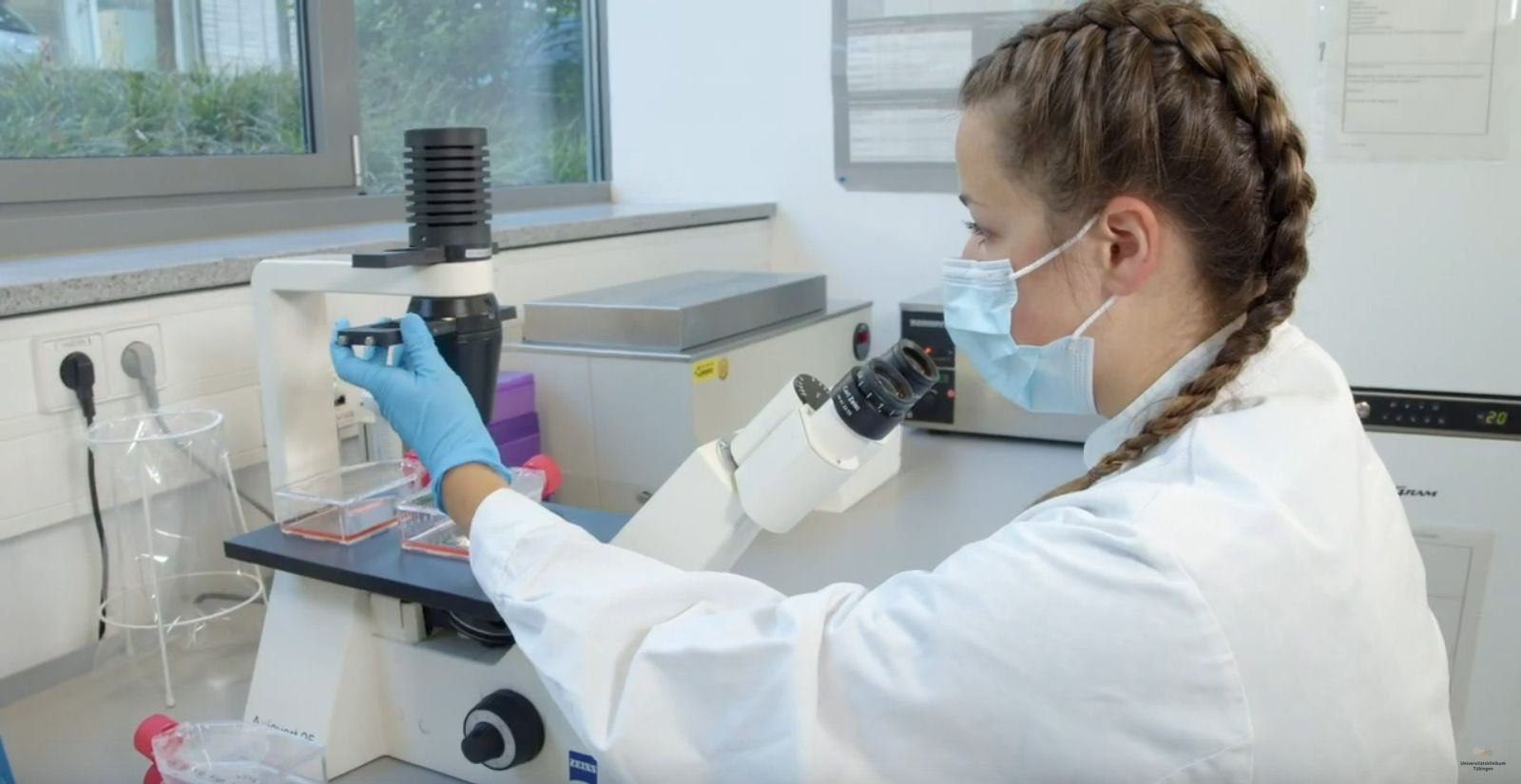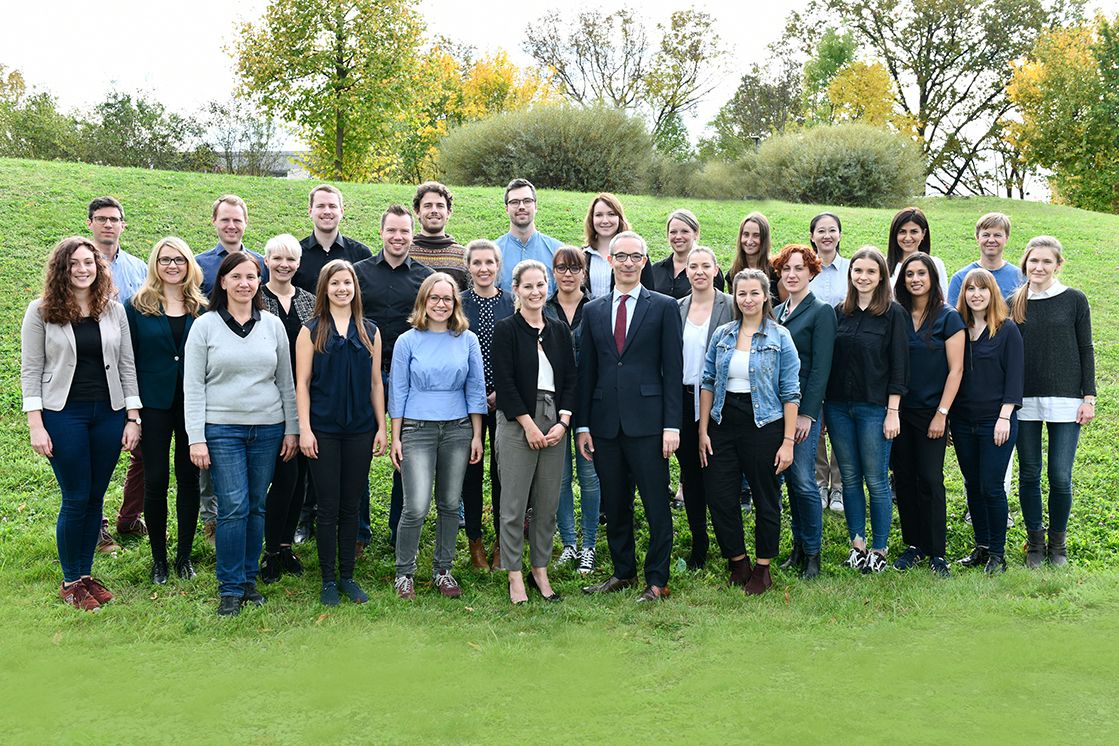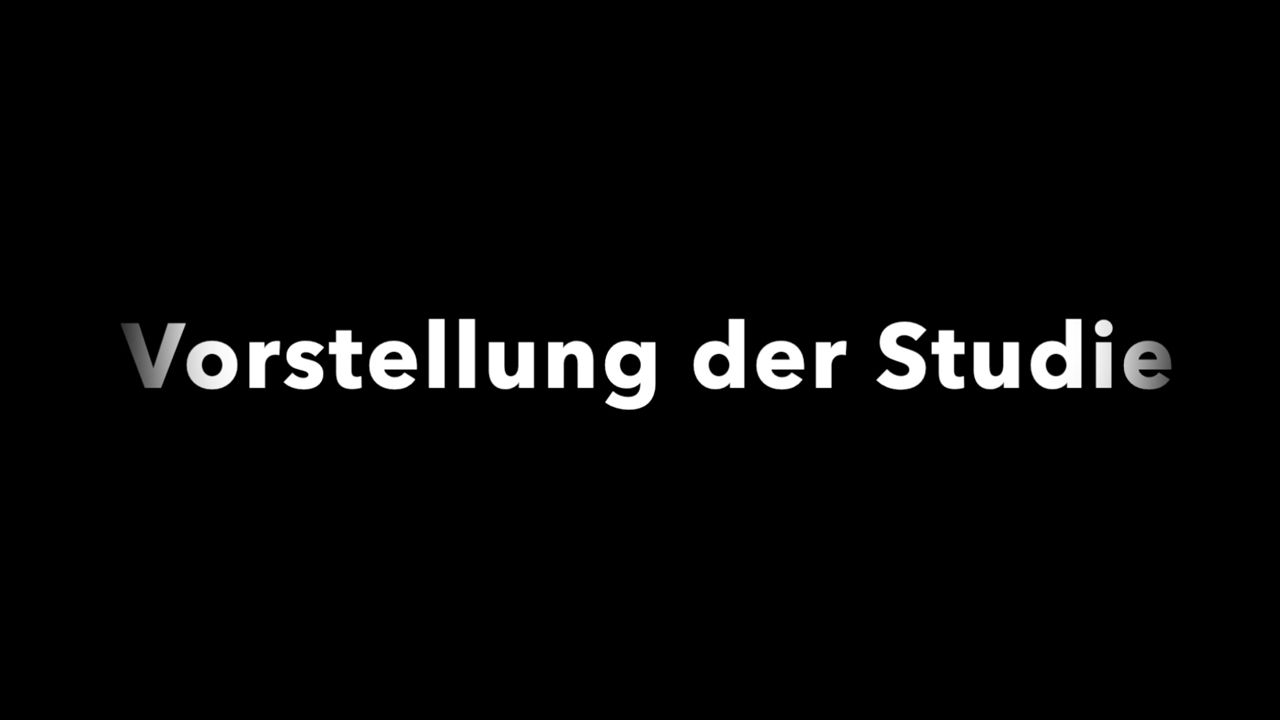The Clinical Cooperation Unit Translational Immunology is a multidisciplinary unit that develops and applies novel immunotherapeutics for cancer patients. It draws on experience obtained in decades of research regarding the development of optimized antitumor antibodies and vaccination strategies, combined with our expertise in the treatment of malignant diseases and the clinical evaluation of new therapeutic concepts. We work closely together with the specialists at the other Departments at University Hospital Tübingen that treat cancer patients as well as the Department of Immunology.
About us
From the Laboratory to the Bedside: The Clinical Cooperation Unit Translational Immunology
From the Laboratory to the Bedside: The Clinical Cooperation Unit Translational Immunology
" We have all been waiting for this headline for decades. Unfortunately, we also know that it is not that simple. Developing new therapies in research laboratories and then applying them in the clinic usually takes several years, if not decades. The vision of the Clinical Cooperation Unit Translational Immunology at the University Hospital Tübingen is to close exactly this gap and to bring innovative therapeutic approaches into the clinic as quickly as possible .
Direction

Prof. Dr. med. Helmut Salih
Medical director
Office:
Phone number: +49 7071 29-83275
Fax number: +49 7071 29-4391
E-mail address: immuntherapie@med.uni-tuebingen.de
Person profile: More about the person

Clinical studies
Basket study DNAJB1-PRKACA gene modification
FusionVAC22_01
Early clinical trial to investigate a therapeutic cancer vaccine together with an immune checkpoint inhibitor in patients with evidence of the DNAJB1-PRKACA gene alteration (e.g. fibrolamellar hepatocellular carcinoma)
FusionVAC22_02
The study investigates the therapeutic cancer peptide vaccine Fusion-VAC-XS15 in patients with fibrolamellar hepatocellular carcinoma or other tumor disease with evidence of DNAJB1-PRKACA gene fusion after successful initial therapy.
Covid-19 vaccine
P-pVAC-SARS-COV-2.
First-in-man study to investigate the safety, tolerability, and immunogenicity of a peptide-based COVID-19 vaccine. (completed)
B-pVAC-SARS-COV-2
Phase II study in participants with congenital or acquired B-cell defect or antibody deficiency. (completed)
Covid-19 treatment with virus neutralizing antibody
COR-101
First-in-human study to evaluate the safety, tolerability and efficacy of the Fc-modified antibody COR-101 in patients with moderate to severe COVID-19 disease. (completed)
AML
CLN-049-002
Phase 1 study to evaluate the safety, tolerability and efficacy of CLN-049 (FLT3xCD3) for the treatment of patients with acute myeloid leukemia (AML) and minimal residual disease (MRD).
CLL: BeliVeR
Proprietary Phase II study in patients with refractory or relapsed chronic lymphocytic leukemia (belimumab in combination with rituximab/venetoclax).
CLL: iVAC-CLL01
iVAC-CLL01
Patient-individualized peptide vaccination after first line therapy of CLL
CLL: iVAC-XS15-CLL01
iVAC-XS15-CLL01
Personalized peptide vaccination in combination with the TLR2 ligand XS15 for CLL patients under ibrutinib treatment.
Recruiting completed!
Prostate cancer
DKTK_PMO_1605
First in human study to evaluate the safety, tolerability and preliminary efficacy of the bispecific PSMAxCD3 antibody CC-1 in patients with castration resistant prostate carcinoma
Start of recruitment planned Q4/2019
ProSperA_CC-1
Application study to investigate the safety, tolerability and efficacy of the bispecific PSMAxCD3 antibody CC-1 in patients biochemical recurrence of prostate cancer.
Colorectal carcinoma
Core_CC-3
Initial application study to investigate the safety, tolerability and efficacy of the bispecific CD276xCD3 antibody CC-3 in patients with metastatic colorectal cancer
Appointments
Please note that for enquiries regarding participation in our clinical trials or for medical consulation on cancer immunotherapy concepts, it is mandatory that the treating physician beforehand provides your treatment documents (current doctor's letter, imaging findings, etc.), ideally via e-mail:
E-mail address: KKETI@med.uni-tuebingen.de
|
Office for clinical studies: |
Sabrina Müller +49 7071 29-82834 |
Patient individual immunotherapy concepts
The direct link between research and patient care enables us to offer our patients newly developed and personalized immunotherapic concepts for tumor diseases.
When playing the video, data is transferred to YouTube. You can find more information in our privacy policy.
News
Antiköper zeigt Verträglichkeit und Wirksamkeit bei der Behandlung der akuten myeloischen Leukämie
In der KKE Translationale Immunologie der Medizinischen Klinik am Universitätskl ...
WeiterPatienten mit biochemischem Rezidiv des Prostatakarzinoms für Immuntherapiestudie gesucht
Prostatakrebs gehört zu den häufigsten Krebserkrankungen von Männern in Deutschl ...
WeiterResearch
The increasing understanding of the mechanisms underlying host-tumor interaction led to development of strategies that harness antitumor immunity for cancer treatment. However, while immunotherapy meanwhile has become a mainstay of tumor therapy, there is still ample room for improvement. Some patients do not respond to presently available approaches at all, others for limited time only, and for many cancer entities so far no immunotherapeutic strategies are available. In our view, this calls for efforts to more rapidly translate promising results from research to clinical application. To achieve this superordinate goal, our work focusses on the following key aspects:
Molecular mechanisms influencing tumor-immune interaction and escape
Here we investigate the role of various immunoregulatory molecules involved in host-tumor interaction, in particular with putative tumor stem cells. Beyond improving the understanding of tumor biology per se, these studies aim to identify new target molecules for immunotherapeutic approaches and to identify prognostic markers for disease progression and response in patients. We further investigate how "conventional" systemic tumor therapeutics influence the immune response to enable rational combinations with immunotherapy. In addition, the development of valid model systems for testing novel strategies prior to application in humans is an important basis to develop rational immunotherapeutics.
Development and clinical evaluation of optimized anti-tumor antibodies and peptide vaccination strategies
The "preclinical" work mentioned above provides the basis for the second focus of our work, which is clearly focused on clinical application. This includes the development of optimized mono- and bispecific antibodies, novel immunocytokines and personalized peptide vaccination strategies. Our efforts cover the entire process, from conception and manufacture to clinical application in patients. This enables the rapid translation of results from basic research to novel therapies for cancer patients ("bench to bedside"). The feasibility of our approach is reflected by our various clinical studies with in-house developed immunotherapeutics.
Research groups
Education and Career
Education
The rapid developments in tumor immunology and immunotherapy during the recent years call for a greater focus on this topic during academic education. Therefore, the CCU Translational Immunology participates in numerous classes and curricula in human medicine, biochemistry, biology and molecular medicine. In addition to strengthening basic immunological education, in our view it is particularly important to inspire students of human medicine for research for tumor immunology. Likewise it is equally important to illustrate the potential, but also the difficulties of translation in the field of immunotherapy to students of non-clinical natural sciences. Accordingly, we consider an early involvement of students and later also resident physicians and PhD students in translational research as a very important aspect of academic education. The various research groups within the CCU Translational Immunology offer the opportunity to gain insights into basic research and translational projects during internships, bachelor's and master's theses as well as medical and scientific doctoral dissertations. We provide numerous opportunities for further education within the framework of the iFIT excellence cluster, the National Center for Tumor Diseases (NCT) Southwest and by attending national and international meetings as well as workshops and courses for career development.
Career
The CCU Translational Immunology offers resident physicians and specialists of the various disciplines involved in treatment of cancer patients the opportunity to gain experience in the development and conduct of clinical trials within the scope of a rotation. With support of our experienced lab staff, this also provides a chance to conduct research projects with the aim to publish scientific work, which enables the application for internal and external research funds as well as research scholarships for stays abroad. For a rotation to the CCU Translational Immunology, a minimum of 2 years clinical experience is mandatory.
Applications from motivated students for a position to conduct a master's thesis or a medical or scientific doctoral thesis are welcome. The same applies to Ph.D. scientists interested in our field.
Contact
|
Administrative office |
+49 7071 29-83275 +49 7071 29-4391 |
E-mail address: immuntherapie@med.uni-tuebingen.de
Current job postings
-
Verwaltungsangestellte (w/m/d) als Assistenz der Abteilungsleitung
Bewerbungsfrist: 04.11.2025 Stellenausschreibung
Certificates and Associations

Focus: Top National Hospital 2025

Stern: Germany's Outstanding Employers in Nursing 24/25

Quality partnership with the PKV

Family as a success factor

Pension provision for the public sector








